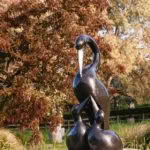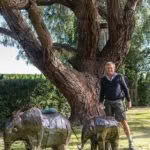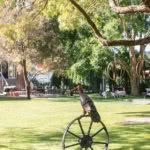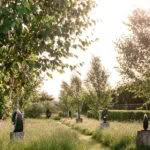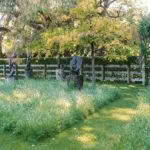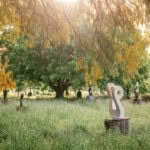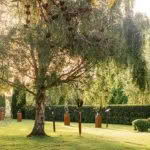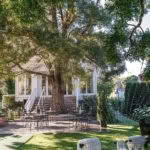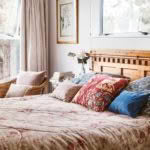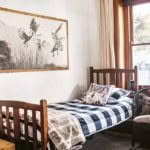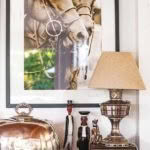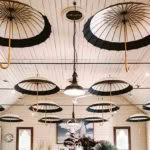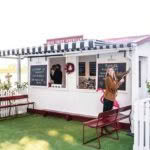From a farm eviction to Havelock North: A family’s journey to the sweet life at Birdswoods
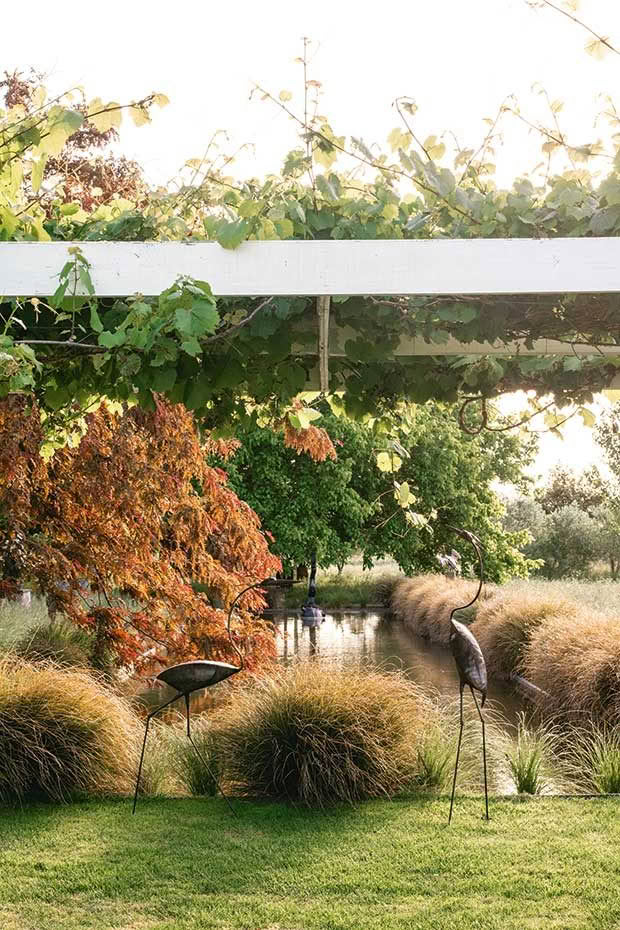
Evicted from their farm in Zimbabwe, a family’s fresh start in Havelock North has brought freedom, and an opportunity to pay it forward.
Words: Fiona Fraser Photos: Florence Charvin
Not for the first time, Bruce and Louise Stobart are packing away their treasures. They are wondering about climate, temperatures, and which clothing is going to be most suitable. They’re making tough decisions about the items to leave, and those to take.
Only this time, they are doing so with clear minds and hope in their hearts. This time, there is no militia at their gate, armed men observing their every move, guns trained on them as they work.
This time, they go by choice.
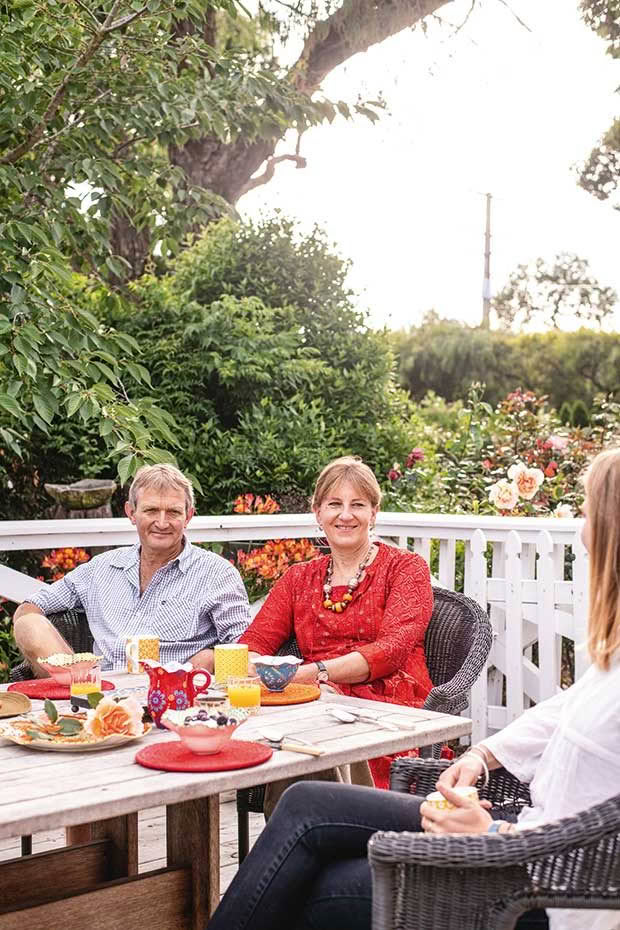
Bruce and Louise own and manage Birdwoods — the gallery, sculpture gardens, event venue, café and sweet shop just south of Havelock North. Home and work are bound tightly together.
There is, explains Bruce, really no such thing as work/life balance when operating a seven-day-a-week business and living onsite. Which is why, after a great deal of consideration, they’re taking a break, and heading to Vanuatu for what they describe as their “gap year”.
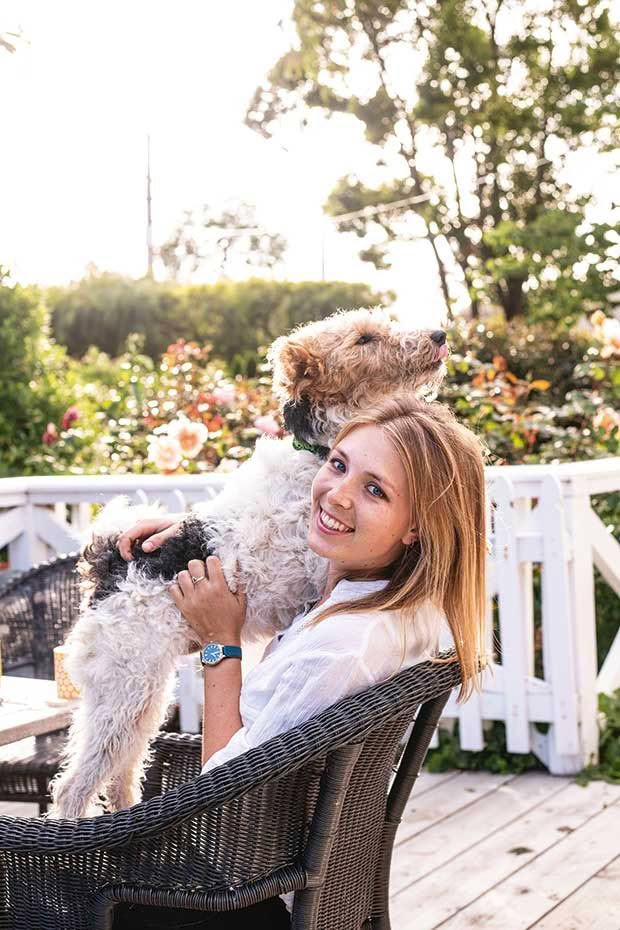
Daughter Sophie and wire-haired terrier Arthur; the New Zealand-made Relko rocking horse in the sitting room is a nod to the family’s African roots — it’s fashioned from Zambian wood.
It’s an understatement to describe their transition to New Zealand from Robert Mugabe’s Zimbabwe in 2004 as traumatic. They arrived with their three young children, broken by what they had seen, survived and experienced, forcibly removed from the 2000-odd-hectare farm that had been their pride and joy.
Some 15 years later, they still ache for what they’ve lost. “It was like a breakup,” says Louise. “We were at the stage where our lives were in danger, everything we’d worked for was being taken from us, we weren’t getting paid for it, and we were losing our livelihood, our identities, our country was suffering, we were losing our friends. But the biggest damage of all — and something that has affected generations now and will impact generations to come — is the splitting up of our wider family.”
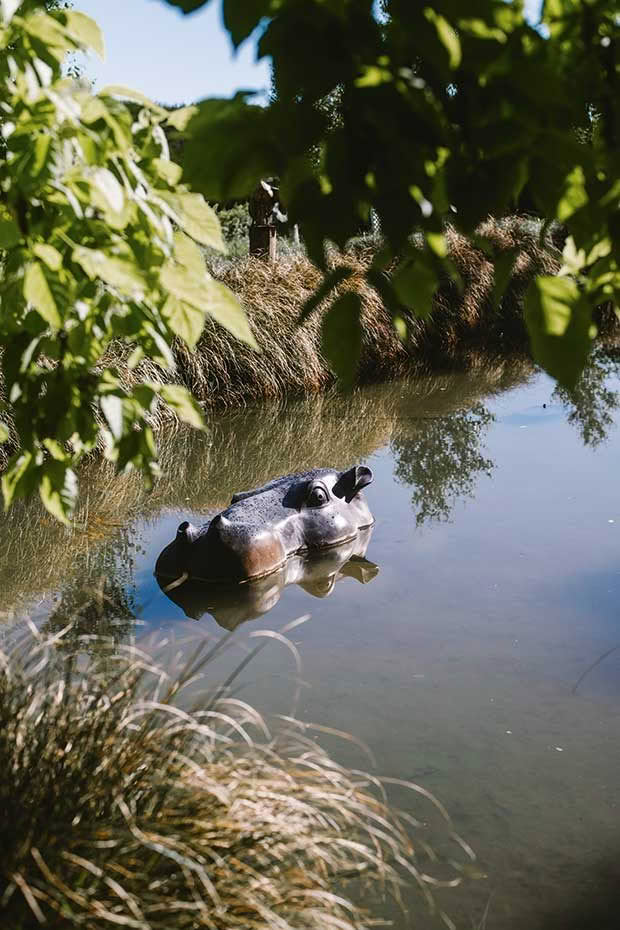
Their land — shallow soil cropped in soya beans, maize, wheat and paprika — was also the base for Louise’s business, which she established in 1991 working with local craftspeople to make bird sculptures from recycled oil drums.
Back when they were newly married, and saving to buy the farm, she and Bruce had identified an appetite for wooden crafts — they would buy directly from the makers and turn a small profit re-selling at craft markets. That idea evolved into making a handful of metal bird sculptures themselves, which proved so popular that the couple shelved their wooden crafts entirely.
“We did try a few mammals,” recalls Louise, “but when you try and create a mammal out of metal, it always ends up looking like a rat or a kangaroo. With a bird, there are feathers, beaks, feet — so birds became our signature.”
The name Birdwoods was arrived at over lunch. “The chutney jar was labeled ‘Sharwood’s of London’ and I thought, well, ‘Birdwoods of Zimbabwe’ has a nice ring.”
Mugabe changed that business too. “By the absolute skin of our teeth we were able to sell it,” Louise says, “and that meant our wonderful workers could continue to craft and earn a living.” Because, she concedes, not everyone was like the Stobarts — that is, able to scrape together enough to leave Zimbabwe, buy land in another country, and start over — and the stories of the many left behind are haunting.
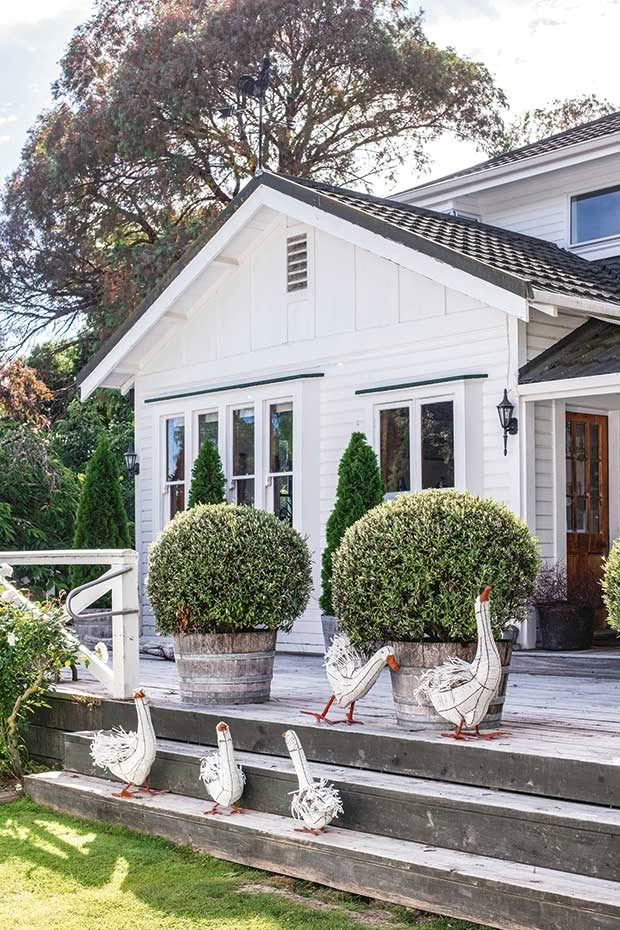
Locals and visitors alike come to Birdwoods gallery, café and sculpture gardens, which is also a warm and characterful family home.
The pair consider themselves lucky that they already had Zimbabwean friends in New Zealand — Rob and KK Marffy, with whom they remain close — and that Bruce’s parents were able to travel with them. Louise’s followed seven years later.
“We’ve been involved in fundraising since then to help a number of people in the community who stayed. It got bad. We’ve heard terrible stories of mental-health breakdowns, marriage breakups, of our elderly eating dog food to get some protein. The people who stayed, and the people who left, we’ve all had our demons to fight.”
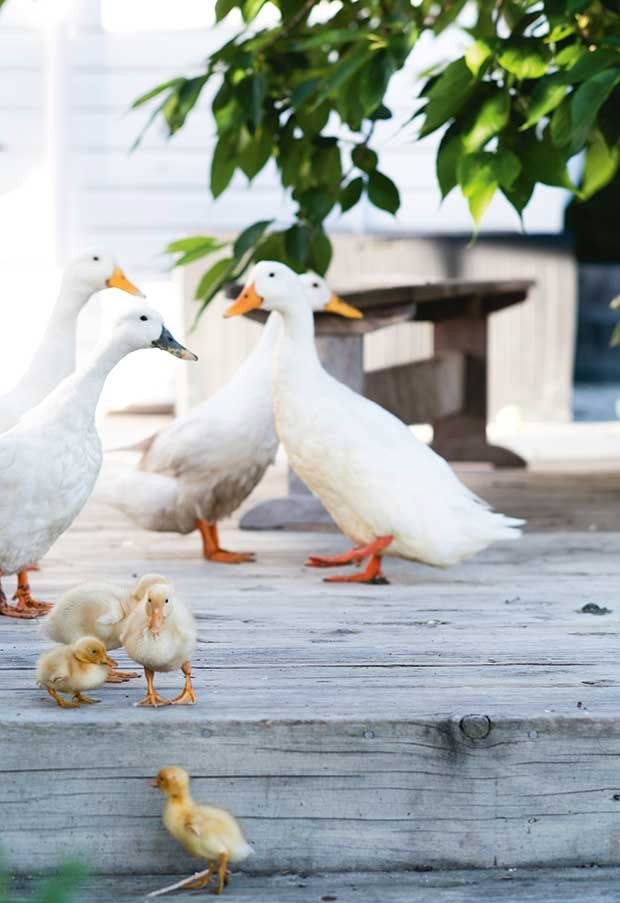
Exchanging the vast landscapes of Mazowe, an hour from Zimbabwe’s capital, for rural Hawke’s Bay, they settled into their new 10-hectare block in Havelock North and their children Jack, Sophie and Harry — then 12, 9, and 6 — started at their new schools.
The land had an apple orchard back then and had been operating as a deer farm. But the Stobarts had plans. They got to work, finding and relocating the old wooden St Peter’s Church hall from Waipawa onto the site as a gallery and café space. “It was going for next to nothing, and we liked its story and its history,” Bruce says.
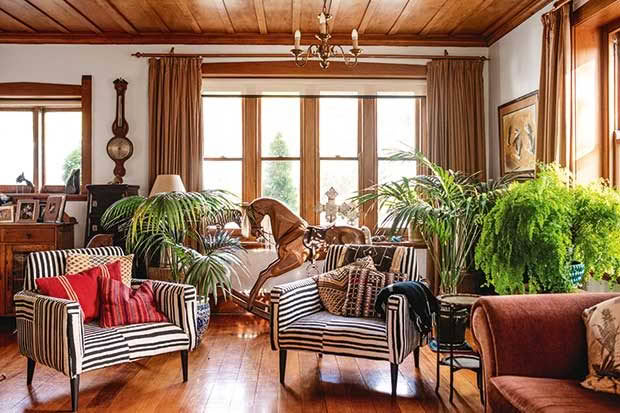
Buying trips take Bruce and Louise back to Africa each year — to Mozambique, South Africa, Malawi and Kenya. On occasion, they also head to India.
“But we made a big mistake in putting it so close to the house. We’ve ended up losing bits of our family home to the business. Our son’s bedroom became the office, and our family kitchen still gets used as overflow when we have busy weekends — staff are constantly popping in and out.”
Reusing, recycling, and repurposing have been the hallmarks of the Birdwoods story. Almost every fixture and furnishing is found, foraged, or purchased second-hand. “That’s a real Zimbabwean thing,” says Louise.
“Everything has been done thriftily through Trade Me or opportunity shops to keep costs down and make our business viable. For instance, after years of making do, we realized one day that we really couldn’t keep running kettles of boiling water out to the café to make tea, so we got a hot water unit for $40 on Trade Me.
“Our electrician couldn’t believe he had to wire the thing and asked us what on earth we were doing. But it paid for itself in a week. And we have only just replaced it, many years later.”
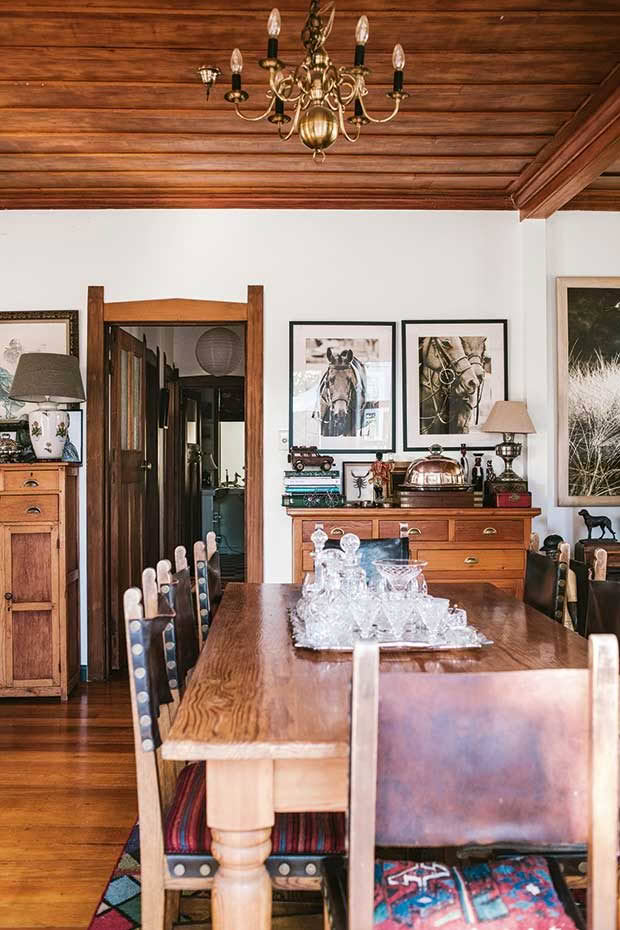
Louise is a lifelong treasure hunter. Her crystal collection in the Stobarts’ dining room is sourced entirely from opportunity shops.
Resourcefulness is something Louise has in spades. She cheerfully admits to failing cookery school, later registering for a secretarial course and failing that too. “But I’m creative, and I have imagination.”
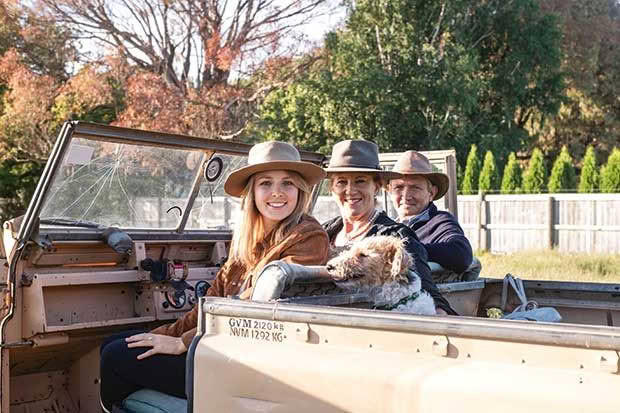
Each Sunday at about 7:30am, the Stobarts hop in their Landrover, which followed them from Zimbabwe, and take a thermos of coffee and a hamper of bacon and egg rolls to nearby Ocean Beach with friends Rob and KK Marffy, heading back to open Birdwoods’ doors by 10am.
What she imagined for herself and Bruce was a sculpture garden attached to their gallery that would help support the people of the country they left behind, and allow the Stobarts to travel back annually.
Now, they visit Zimbabwe’s best sculptors each year, dealing directly with makers, asking questions, assessing quality and craftsmanship, and filling a container to ship here.
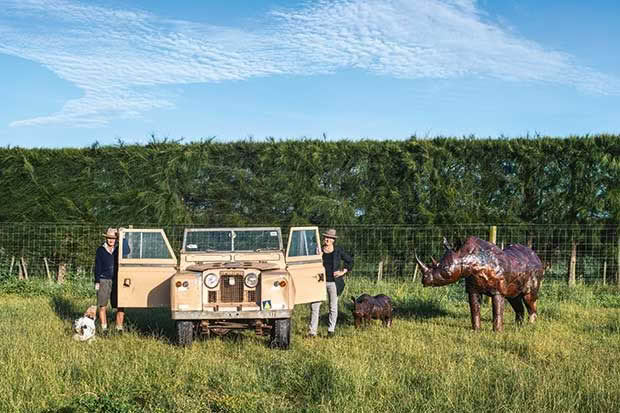
“It doesn’t matter if it’s windy or cold — the beach is beautiful and it’s right on our doorstep. Coming from a landlocked country we don’t take the sea for granted,” says Louise.
Do they ever call in at the family farm? “No,” says Louise.
Is it too painful? Hard to talk about?
“It’s just so overgrown, and it isn’t advisable to visit. It was a toxic time and it wasn’t all that long ago. Things could flare up again. And yes, it still feels like it was yesterday. It’s still traumatizing. The children had to cope with their fair share of adjustment and talking to them now as adults I can see what an impact everything has had — the living in constant fear, losing our farm, moving, the threats we were all under. So when I’m asked that question, I always feel strong emotion. It’s like, ‘Woah, here it comes again.’”
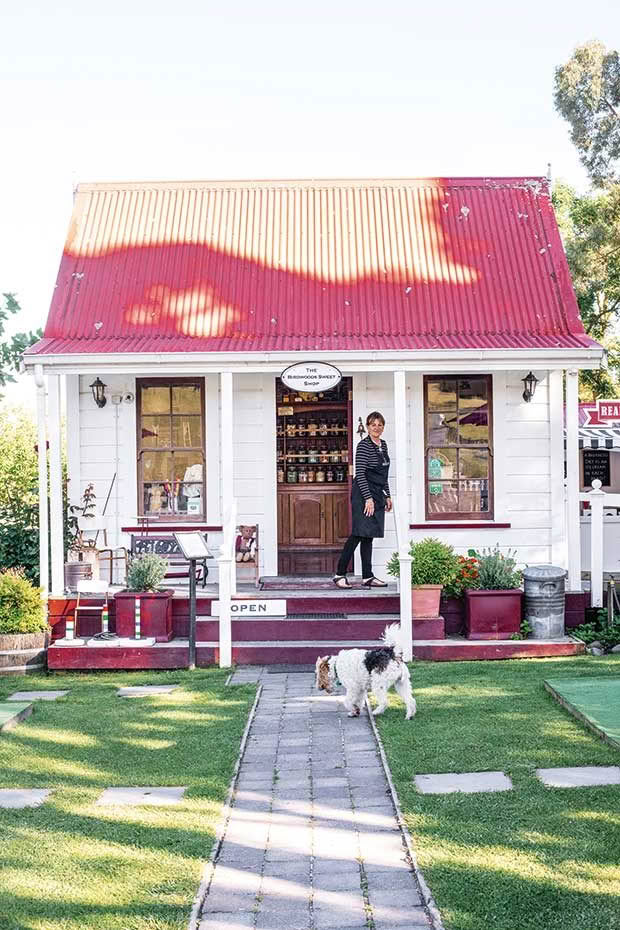
Arthur is always popular with children who spend their pocket money at the sweet shop.
For the Stobarts, it’s giving back that counts. Louise sits on the board of the Hawke’s Bay Tourism Industry Association and is a huge advocate for the region.
And as they leave for Vanuatu, to power down, live off the grid, and renovate a house, they are handing the Birdwoods reins — albeit temporarily — to a new family equally touched by political turmoil, instability and worry.
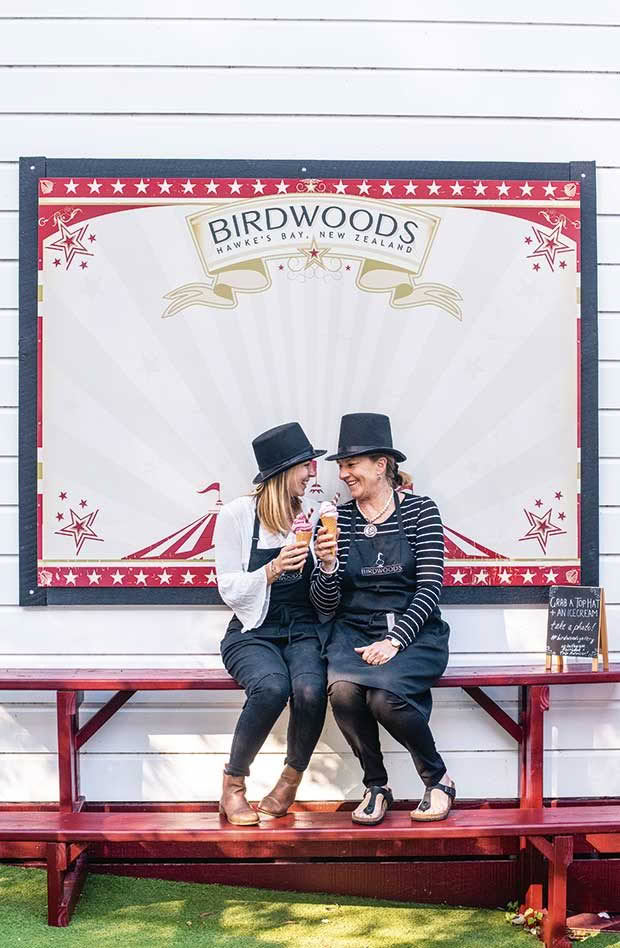
There are stilts, skittles and other outdoor games for families to enjoy when they visit.
Kerry and Gregg Mousley were introduced to Bruce and Louise over email, and a conversation commenced. They are South African — farmers, lodge hosts, brewers, retailers. And like the Stobarts, they’ve moved to New Zealand with their school-age children, ready to make a fresh start, immerse themselves in their new home, and give it everything.
“People were lovely to us when we arrived and, because the universe moves in mysterious ways, now we have an opportunity to pay it forward and give them the best start possible,” says Louise.
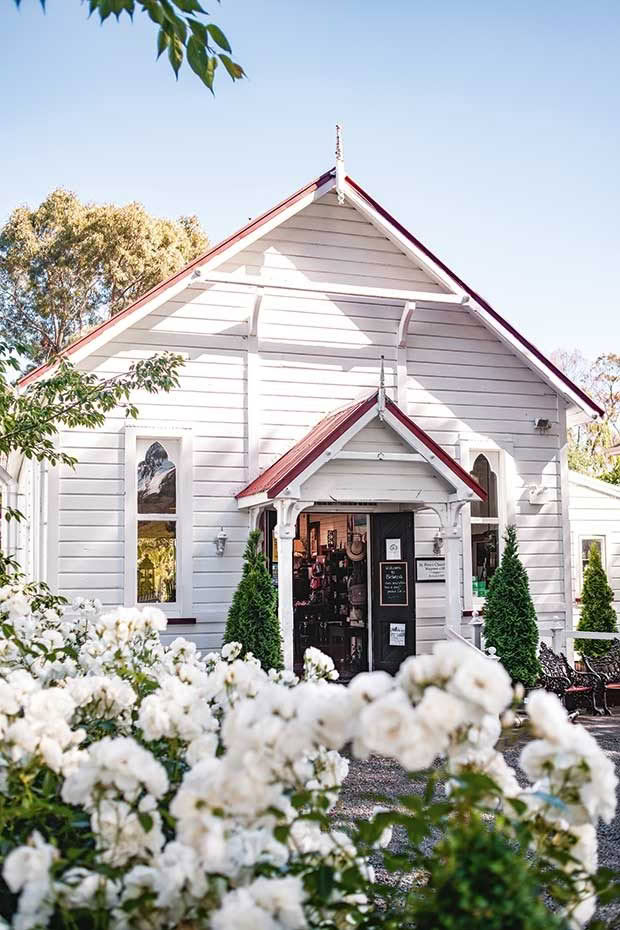
“They will be good New Zealanders and wonderful hosts. It actually couldn’t have worked out better for us, and they can’t believe how lucky they are, too. We think they’ll love our customers. And our customers — we know — will love them.”
THE SWEETEST SWEET SHOP EVER
This tiny wooden cottage — knocked together from timber salvaged from the old Wellington and Napier hospitals — is a Wonka-worthy fantasy land of fruit sweets, jelly babies, liquorice, handmade chocolates and sticky caramels.
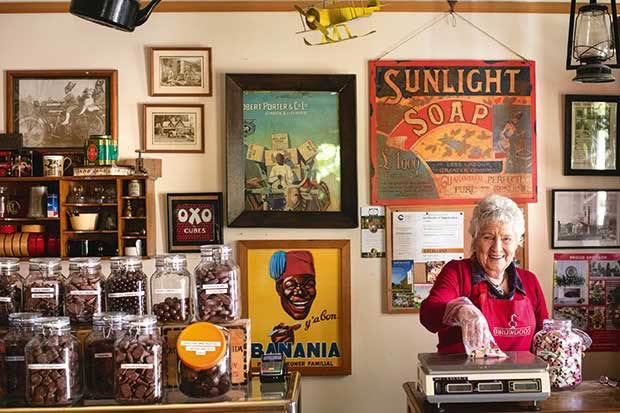
Lorraine Bron is Birdwood’s oldest serving staff member and one of the much-loved “grannies” kids find behind the counter.
Confectionery is housed in large stacked glass jars and weighed out on scales. And flushed faces watch closely as their treasures are carefully cellophane-bagged, and tied with brown twine.
Birdwoods Sweet Shop has become something of an institution, as much for its delicious sweets sourced from France, England, Holland, Australia and New Zealand as for the grey-haired, aproned women who work there.
- Parasols decorate the café and gallery ceiling and add a touch of drama to the relocated wooden church that houses the Birdwoods gallery..
- Real fruit ice cream is a crowd favourite at Birdwoods.
- Real fruit ice cream up-close.
“We try and stay true to that old-fashioned confectionery story and deliver a memorable experience, and that means you have to be a grandparent to work here,” says Louise. “We find our sweet-store staff to be absolutely amazing when dealing with our little customers — they know service, they know time management, and they are wise and warm.”
Aside from one, it would appear. “The other day, a little boy opened the door and peered inside, then ran back out and called ‘It’s OK, Mum. You can come inside. It’s not the grumpy one.’”
MUGABE’S REIGN
Robert Mugabe became Zimbabwe’s prime minister in 1980 and then changed the constitution in 1987 so that he could rule as president. In total, he led the country for almost four decades, ending white-minority rule.
He is known for many things — vastly improved access to healthcare and increased literacy rates were the highlights of his reign.
But he also employed troops to kill civilians thought to be attempting to overthrow his government, and evicted white farmers, seizing their land, looting, raping and killing, redistributing the property to black nationals, and sending the economy into a tailspin.
In the 2008 elections, Mugabe lost to Morgan Tsvangirai but, claiming that “only God” could remove him from office, refused to budge. He rounded up his army, unleashing violence on challengers, closing newspapers, and printing so much currency that inflation reached 500
billion per cent.
Tsvangirai surrendered his power to save lives, and Mugabe went on to lead the country until 2017, when suggestions he was grooming his wife Grace, 40 years his junior, to take over from him caused the army to intervene and remove Mugabe from power.
Estimates put the death toll during his reign at 20,000.
